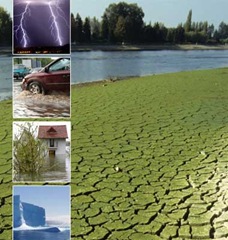Climate Change Ups War Risk in Many States
LONDON - Climate change will put half the world's countries at risk of conflict or serious political instability, a report said on Tuesday, making the world more unstable unless nations and communities consider problems now.
 International Alert, a London-based conflict resolution group, identified 46 countries -- home to 2.7 billion people -- where it said the effects of climate change would create a high risk of violent conflict. It identified another 56 states where there was a risk of political instability.
International Alert, a London-based conflict resolution group, identified 46 countries -- home to 2.7 billion people -- where it said the effects of climate change would create a high risk of violent conflict. It identified another 56 states where there was a risk of political instability.
"It is about half the countries in the world," International Alert secretary general Dan Smith told Reuters in a telephone interview. "I would expect to see some pretty serious conflicts that are clearly linked to climate change on the international scene by 2020."
Climate change will affect water supplies, growing seasons and land use, he said, bringing communities in the poorest and most vulnerable countries into conflict.
Near the top of the list are west and central Africa, with clashes already reported in northern Ghana between herders and farmers as agricultural patterns change.
Bangladesh could also see dangerous changes, while the visible decline in levels of the River Ganges in India, on which 400 million people depend, could spark new tensions there.
Water shortages would make solving tensions in the already volatile Middle East even harder, Smith said, while currently peaceful Latin American states could be destabilised by unrest following changes in the melting of glaciers affecting rivers.
GETTING MESSY FAST
Unless communities and governments begin discussing the issues in advance, he said, there is a risk climate shift could be the spark that relights wars such as those in Liberia and Sierra Leone in west Africa or the Caucasus on Russia's borders. Current economic growth in developing states could also be hit.
"Our experience shows it can be an exacerbating factor of conflict," Smith said. "The question is how well communities and governments handle the risk."
Smith said was difficult to isolate current climate-related wars, although climate shift and farming disputes are a factor in fighting in Sudan's Darfur region.
He said climate-related open fighting was likely to be limited to the world's poorer regions, but that richer nations in northern Europe or North America would suffer from greater global instability.
The good news, he said, was that if groups and officials were able to discuss the issues to help prevent conflict, that would in itself help them deal with the actual problems.
"If there are not the institutions and organisations to handle it, people start looking out for themselves and then they start organising for fighting and you can get a very messy situation very quickly," Smith said.
"There are literally hundreds of millions of people at risk from conflict from climate change and we have to start talking about these issues." (Editing by Catherine Evans)
Planet Ark : Climate Change Ups War Risk in Many States - Report

